independence day
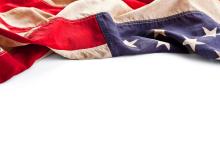
There’s always been a deep tension between those who believe the powerful words about freedom for all and those who believe that such freedom should be reserved to them alone. There have always been those who believe that their personal freedom is unbreakable but the freedom of others can be rationed.
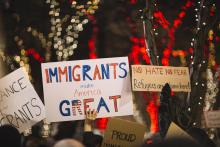
We in the church have clung too tightly to our country’s myths of exceptionalism. We’ve been too slow to name the real “terror within” and unwilling to listen to those telling us of terror all around. We’ve been reluctant to own up to our history and speak out against unjust policies . We don’t like to think or talk about it, but most of us know that our quality of life here comes directly at the expense of everyone else on the planet (not to mention the planet itself), millions of ordinary folks whose countries have been ravaged by centuries of colonialism and persistent neocolonial structures, who make our clothes and gadgets, grow our food and coffee, and pay in countless other ways for all our out-of-control consumption and addictions. Their problems are our problems. So we can’t set them aside.

We pass our indifference down generation to generation. To fix that, it is not that we create a generation of religious zealots, but we raise up young people who are aware of the world around them, who are not blanketed by their privilege, who learn to take hold of what God has given them instead of complaining about it. We raise our children to ask questions, to live in love, to value human life and our created world in every country, in every situation.
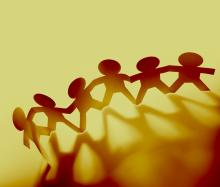
I did not celebrate Independence Day this past weekend.
The truth is the United States has never been an independent nation. Built on stolen land by stolen labor, sacrificing Natives and Africans and their descendants to the mythology of “manifest destiny,” greed, oppression, and white supremacy, this has never been a nation of liberty and justice for all.
The ignoble myth of white supremacy that permeates the foundation of this country and underlies the policies and institutions that form the context of our lives has been rearing its ugly head so much lately that it cannot be as easily ignored or denied as it has been in the past. The recent massacre in Charleston and the burning of African-American churches add even more reasons to the hundreds of thousands to awaken to the reality of racism that undermines best ideals of this nation. Our country has failed to atone for, or even critically examine, its history of racial oppression.

There have been Ingelses of my line in the United States, the colonies, since well before our independence was declared. And my mother's family, too, has deep American roots representing various social, political, and spiritual diasporas.
My family lore and mystery include numerous tales of revolutionaries, pioneers, early American educators, statesmen, industrialists, philanthropists, and even Indian captives. Many of you have probably read the works of one of my forebears, Laura Ingalls Wilder, who recounts what life was like for people who headed into great unknowns to make familiar places for themselves, a sense of home, community, belonging.
Other well-known American ancestors were DeHarts and Boones, people whose vigor and muscle are legendary in the colonies and at various points along the frontier.
And of this stock in my stew, I am ever proud.
But every American started as an immigrant, and along the lines leading to me are other sorts of immigrants, too.

As we celebrate our nation’s independence this week, it’s good that we also celebrate our interdependence. Everything that we do, everything that we have, all that we are bears the fingerprints of countless others from around the world who have brought us to this moment and sustain us in it.
We tend to overlook this reality. We like to think of ourselves as independent. We dread those times when we feel dependent upon others — when we’re sick or struggling and need some sort of assistance. We’d rather do it ourselves and feel independent, even though we‘re really not.

On July 4th I will be attending the annual party at my son and daughter-in-law’s home. They will be serving up smoked chicken and spare ribs while fireworks from neighboring towns inscribe a nearly 360° circle around their backyard. While we are waving our flags with differing degrees of enthusiasm, one member of my family will not be with us: my sister the Jehovah’s Witness. As much as we’ve tried to persuade her that the holiday is just an excuse for the family to get together, she will not give succor to patriotic fervor. By partaking of our celebration she feels that she risks having her attendance misinterpreted as an endorsement. For Jehovah’s Witnesses, the trouble with patriotism is twofold: 1) it tempts us to equate God and nation, and 2) it provides a sacred cover for violence.
God and nation are not the same, my sister believes. When a government’s demands come into conflict with God’s, Witnesses obey God. Jehovah’s Witnesses believe that Jesus emphasized love of neighbor and service to others and that the early Christians refused to become soldiers and fight in wars. In emulation of that dedication to serve God and not governments, Witnesses not only refuse to celebrate national holidays but they are conscientious objectors to military service.
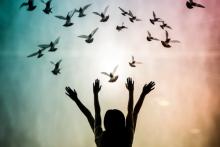
Tomorrow, millions of people across this land, will be celebrating our nation’s freedom. Many will be marking Independence Day by going to see the fireworks, watching Fourth of July parades, or just having a barbecue and enjoying time together with their family or friends.
One of the things I began doing a few years ago on the Fourth of July was to call a very special person in my life and in the life of my family. His name is Paul Anderson. Had it not been for Paul and his family, my family and I would not have been able to emigrate in 1987 from Poland to the United States. So on every July 4, I call Paul and thank him for helping me and my family arrive safely and settle in this country.
I tell him that he’s had an important part to play in so many good things I’ve experienced over the past 26 years that I’ve been living here — including discerning a Franciscan vocation and becoming a friar.
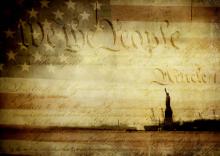
What do I love about America? I love the land, one of the most spectacularly beautiful countries in the world (and I’ve visited many of them). I love walking our long stretches of beaches, hiking our majestic mountains, seeing the desert skies, walking beside the rivers, sailing along the coasts, and visiting hundreds of lakes in my home state of Michigan, where I camped as a kid. I even love some of our big cities! “O beautiful for spacious skies, for amber waves of grain, for purple mountain majesties, above the fruited plains.” I love our many diverse cultures, including their music, their food, their art, their sports, and their particular stories and histories.
I especially love our best national values: freedom, opportunity, community, justice, human rights, and equality under the law for all of our citizens of every race, creed, culture, and gender, not just for the rich and powerful. In particular, I love our tradition and history of democracy, its steady expansion here, and how it has inspired the same all over the world. We take legitimate pride in seeing how our founding documents have been the models for many new nations.
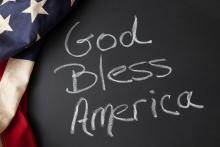
When it comes to God and country, white evangelicals report the strongest levels of patriotic feelings in a new poll, with more than two-thirds (68 percent) saying they are extremely proud to be an American.
That figure was markedly higher than for white mainline Protestants (56 percent), minority Christians (49 percent), Catholics (48 percent) and religiously unaffiliated Americans (39 percent), according to the study, conducted by the Washington-based Public Religion Research Institute in partnership with Religion News Service.
White evangelicals are also more likely than any other religious group surveyed to believe that God has granted the U.S. a special role in history (84 percent) and to say they will likely attend a public July 4th celebration (62 percent).
As I celebrated my freedom on Independence Day, I found myself considering the promise that my country boasts about: "liberty and justice for all." In particular I was struck by the many freedoms uniquely absent from the lives of so many American workers.